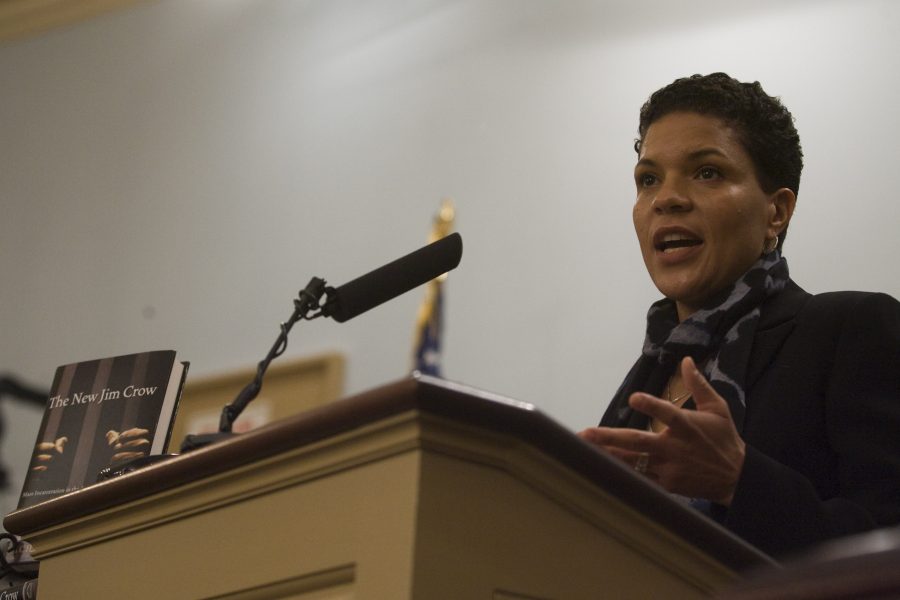Michelle Alexander Headlines 21st Annual Derrick Bell Lecture
Michelle Alexander speaking at the Miller Center Forum on Dec. 3, 2011. Alexander, the author of “The New Jim Crow,” gave the 21st Annual Derrick Bell Lecture on Race in American Society at NYU Law on Thursday.
November 4, 2016
Janet Dewart Bell led the audience in the Stevie Wonder rendition of Happy Birthday at the 21st Annual Derrick Bell Lecture on Race in American Society on Thursday. This event was created to celebrate the 65th birthday of her late husband, civil rights lawyer Derrick Bell, who passed away in 1995.
This year’s lead speaker was Michelle Alexander, author of “The New Jim Crow: Mass Incarceration in the Age of Colorblindness,” which has been a New York Times bestseller for 134 weeks. She is also a senior fellow at the Ford Foundation and a visiting professor at Union Theological Seminary, where she will explore the spiritual and moral aspects of mass incarceration.
Derrick Bell is celebrated for his 50 years of work fighting for civil rights and was a litigator for the NAACP Legal Defense Fund from 1960 to 1965. He was also the first tenured African-American professor at Harvard Law School and was a visiting NYU Law Professor. However, among all his career accomplishments, he was most proud of his work as a teacher.
Janet Bell said her late husband was extremely focused and dedicated to education.
“Derrick lived to teach, and teaching kept him alive,” Bell said. “For him, it was always students first. IIt was a mantra in our household — for him, there was no higher calling than [being a] teacher.”
Rather than give a rehearsed speech, Alexander chose to deliver her message through a discussion moderated by NYU Professor of Clinical Law Tony Thompson.
Alexander focused the discussion on a lot of the recent realizations made by politicians in light of America’s racially tense climate. She pointed out that the system of mass incarceration could not continue as is without some form of raised taxes on white people. She also brought to light the parallel between the recent attention given to mass incarceration and the new development of heroin addiction in white Americans.
“Now that white folks are facing drug addiction and drug abuse and dealing with the prospect of their loved ones facing harsh mandatory minimum sentences, suddenly we hear politicians saying ‘Oh now it’s time for us to show greater care, compassion and concern for those who are suffering from drug addiction,’” Alexander said.
She also said that Derrick Bell’s interest convergence theorem, which says that white people only stop oppressing black people when it aligns with white interests, explains the recent momentum for criminal justice reform.
“This turn in national consciousness I don’t think can be explained simply by a growing concern for the black lives that have been shattered by mass incarceration,” Alexander said. “I think this sudden interest in criminal justice reform, even among many conservatives, is better explained by Derrick Bell’s interest convergence theory.”
Alexander believes that college students can take initiatives to challenge the systems they are a part of. She said that campus-wide efforts to ban the box and divest from fossil fuels are important ways to show how universities benefit from certain systems of oppression that exploit other people worldwide.
“I think that those kinds of efforts are critical and necessary and a great way of raising consciousness levels,” Alexander said. “It’s important for students to get off campus and engage with folks who are doing this work in the communities that are most impacted.”
Email Sayer Devlin and Natasha Roy at [email protected].

























































































































































